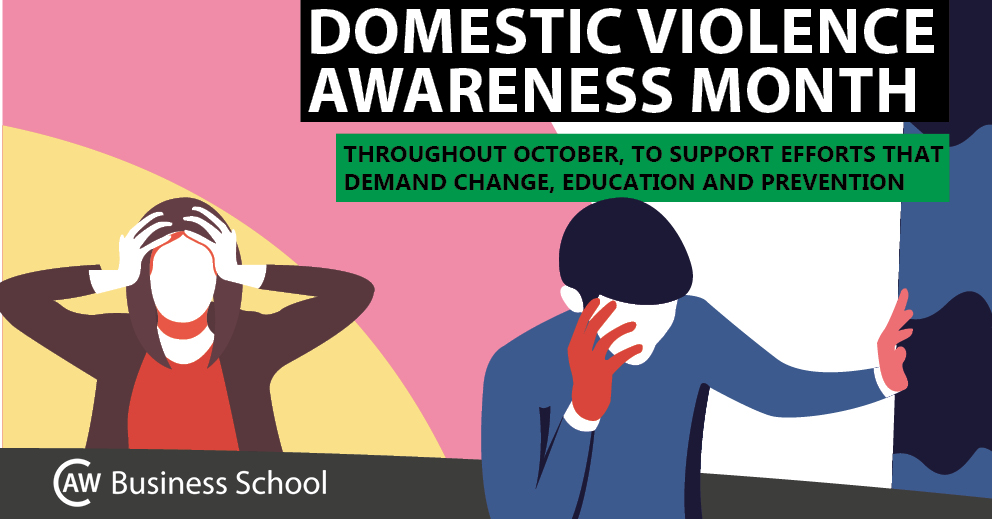Domestic Violence Awareness Month: Supporting Yourself and Others
Posted: 8 October 2019 at 8:26 am | Author: CAW Business School
Domestic violence affects millions of people, both women and men, of every race, religion, culture and status. On average, the police in England and Wales alone receive over 100 calls relating to domestic abuse every hour.* Read on to learn more about the signs of domestic abuse, including where to go for help if you need it and how to support others.
Warning signs of an abusive relationship
We all have arguments with our partners and family members occasionally, and sometimes we say or do hurtful things that we later regret and apologise for. But if this behaviour is becoming a regular pattern, then it may be a sign of domestic abuse.
Abuse comes in many different forms and includes more than just physical violence. It’s stalking, manipulation, yelling, humiliation, coercion, threats and isolation. It can also be stealing a pay check, checking phones and social networks or calling someone stupid so often they believe it. The common trait is that it’s always about having control and power over the other person.
If you’ve ever felt afraid of your partner/family member, or changed your behavior because you’re afraid of what they might say or do, you may be experiencing domestic violence.
Ask yourself whether your partner or family member does any of the following to you. If you answer yes to any of them, you may be in an abusive relationship…
| Abuse | Signs |
| Emotional abuse | • Deliberately belittles or humiliates you alone as well as in front of others • Decides what you wear or eat, or how you spend your money • Unfairly accuses you of flirting or cheating • Stops you from going to work or school • Makes unreasonable demands for your attention • Isolates you from seeing your friends and family • Blames you for his or her abusive behavior or violent outbursts |
| Physical abuse | • Hurts you physically (e.g hitting, beating, punching, pushing, kicking, choking, biting) including with a weapon • Throws things at you |
| Threats and intimidation | • Threatens to hurt you, your children, other loved ones, your pets or themselves • Harasses or follows you • Stands over you or invades your personal space • Destroys things that belong to you |
| Sexual abuse | • Touches you in a way you don’t want to be touched • Make unwanted sexual demands • Hurts you during sex • Forces you to have sex when you don’t want to • Pressures you to have unprotected sex • Controls your birth control or insists that you get pregnant |
| Financial abuse | • Controls your money, or refuses to give you enough money to buy food or other essential items • Requires you to account for everything you spend • Limits your access to your own or shared bank accounts |
| Online abuse | • Checks your phone, email or social networks without your permission or insists they monitor and have access to your passwords/online activity |
If you think you may be in an abusive relationship, it’s important to remember that you’re not responsible for your partner or family member’s behaviour, you don’t deserve to be treated this way despite what they may say and you don’t need to stay silent in fear of the person who is hurting you. There are many people who can offer support and help keep you and your loved ones safe.
What to do if you decide to seek help
You don’t need to wait until you’re in immediate danger or in an emergency situation to seek help. If you decide you want to tell someone and gain some advice and support, you can do so by:
- Speaking to your doctor, health advisor or midwife
- Calling a helpline
- Women can call the free 24 hour National Domestic Violence Helpline on 0808 2000 247
- Men can call the Men’s Advice Line free on 0808 801 0327 (Monday-Friday 9am-5pm) or ManKind on 01823 334 244
- In an emergency, call 999
If you’re worried about how you will support yourself if you decide to leave your partner or cut ties with a family member, Women’s Aid provides a free handbook providing practical support and guidance on every aspect of seeking support; including legal rights, money issues, supporting children, health, well being and much more.
How to help others who may be in an abusive relationship
If you’re worried someone you know is in an abusive relationship, let them know you’ve noticed something is wrong and you’re there to help them if they ever need it. It’s not your place to tell them to leave the relationship if they’re not ready to do so – it’s their decision. However, you can be there for them as a friend and help them in lots of ways if they confide in you:
- Listen without judgement
- Tell them nobody deserves to be treated in the way they’re being treated, despite what the abuser has said
- Ask if they have suffered physical harm and go with them to a hospital or GP if needed
- Help them report their abuser to the police if they choose to do so
- Encourage them to talk about their feelings and experiences, but don’t push them if they don’t want to
- Provide information on organisations who can help if needed
Sources
This article has been informed by the following sources, where you can find further information about domestic violence:

